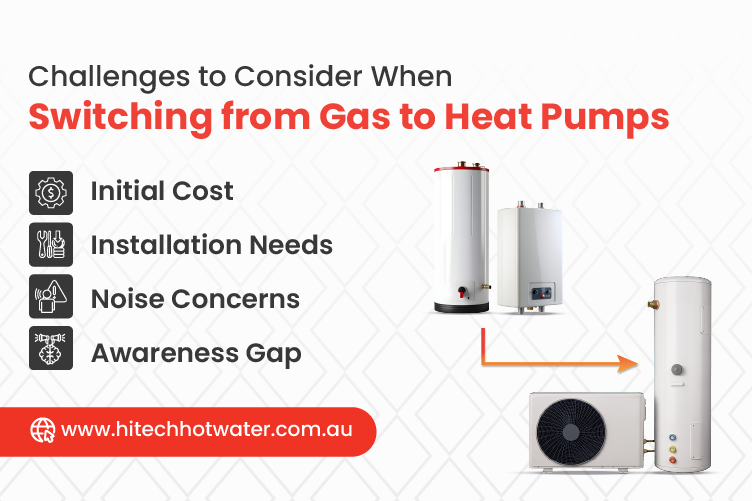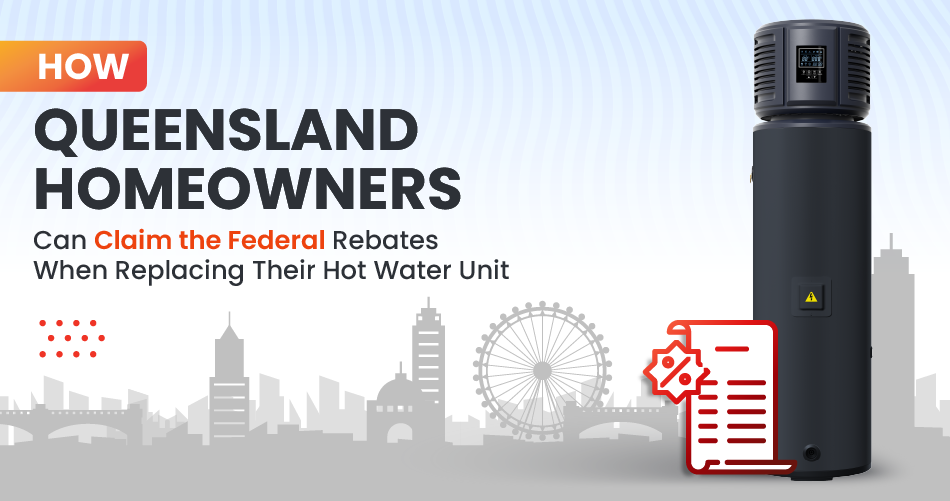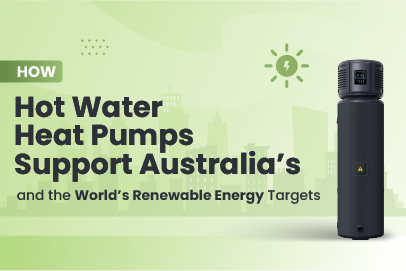As NSW and VIC forge ahead with ambitious sustainability goals, homeowners and businesses are increasingly turning away from traditional gas systems. The rising cost of gas, government policies phasing it out, and the push for electrification are accelerating the demand for high-efficiency heat pumps. These systems not only provide an eco-friendly hot water system but also deliver long-term cost savings and enhanced energy efficiency. The clear benefits in the heat pump vs gas system debate are making heat pumps the preferred choice for modern Australian households
Why People Are Moving Away from Gas in NSW and VIC
Across Victoria and NSW, households and businesses are rapidly shifting away from gas—embracing cleaner, more efficient alternatives like heat pump technology. This transition isn't just about sustainability—it's about real savings and smarter living.
Big Incentives, Bigger Savings
The Victorian Government is backing the shift with major programs. Solar Victoria's $10 million Residential Electrification Grants offer combined incentives of up to $2,400 per customer for solar panels, hot water systems, and heat pumps—helping reduce emissions while slashing energy bills (Victoria's Electricity Future Report).
Solar Homes Program: Over 340,000 Households Supported
Since its launch in 2018, the Solar Homes Program has delivered 340,000+ rebates and loans to help Victorians install solar PV, battery storage, and eco-friendly hot water systems like heat pumps. The results?
- 3.25 million tonnes of CO₂ cut from the grid
- 98 GW of clean energy generated—equivalent to a large power station (Victoria's Electricity Future Report – Action 6).
Powering Social Housing with Clean Energy
A dedicated $112 million Energy Efficiency in Social Housing initiative is electrifying public housing with upgrades like heat pumps, reverse-cycle air conditioners, and electric cooktops, helping low-income families ditch gas and lower their bills (Victoria's Electricity Future Report – Action 7).
The Impact of the VEU Program
- 3 million+ households and 170,000+ businesses have joined theVictorian Energy Upgrades (VEU) scheme
- In 2023 alone, over 506,000 homes received energy-efficient products like heat pumps
- Households are saving up to $150, and businesses up to $870, on energy bills over 10 years
Projected to cut electricity usage by 7% by 2025, saving $3.8 billion in system costs (Victoria's Electricity Future Report – Action 6).
In Victoria, the government's electrification push is not just policy—it's progress in action. From mandatory energy efficiency standards for rentals to targeted support for apartment buildings and low-income households, the state is making it easier than ever to leave behind outdated gas systems. With around 65% of Victorian apartments being rented, programs like Solar for Apartments are helping renters enjoy the benefits of clean technologies like heat pumps, ensuring no one is left behind in the shift to smarter, greener living (Victoria's Electricity Future Report – Action 7).
The Benefits of Heat Pumps as a Gas Alternative
Heat pumps offer an eco-friendly hot water system solution for NSW and VIC homeowners looking to move away from gas. Unlike combustion-based systems, they draw heat from ambient air, reducing electricity use by up to 60–75% compared to traditional electric systems (Sustainability Victoria).
With rising gas prices, switching from gas hot water to heat pump can save households hundreds annually—especially when combined with rebates under the Victorian Energy Upgrades Program.
Environmentally, heat pumps support decarbonisation by lowering greenhouse gas emissions and aligning with state electrification goals. They're also built to deliver consistent performance year-round, even in colder climates, thanks to smart technology and inverter-driven efficiency.
The Growing Demand for Heat Pumps in NSW and VIC
The shift toward cleaner, more energy-efficient technologies is clearly reflected in the growing popularity of heat pump systems across New South Wales and Victoria. With government policies favouring electrification and consumers seeking sustainable alternatives, heat pump adoption is accelerating at an unprecedented pace.
Strong Growth Backed by National Data
According to the CSIRO's Australian Housing Data Dashboard, heat pumps are now the fastest-growing segment in the hot water appliance market. In both NSW and VIC, the uptake of heat pumps has risen steadily year over year, as households move away from gas-fired systems in favour of efficient electric alternatives.
Increasing Consumer Awareness and Preference
Rising energy bills and unstable gas prices are prompting homeowners to seek long-term, cost-effective solutions. Informed by growing awareness, many households in NSW and VIC are replacing outdated gas units with high-efficiency heat pumps—especially where solar PV systems can enhance savings and performance.
Market Trends Reflect a Permanent Shift
CSIRO data confirms a lasting transition: Australian households are steadily adopting electric heat pump systems as the new standard. With improving infrastructure and continued government rebates, demand is expected to rise, solidifying heat pumps as the go-to eco-friendly hot water solution in both states.
Challenges to Consider When Switching from Gas to Heat Pumps

Switching from gas hot water to heat pump systems offers long-term benefits but may involve some upfront challenges:
- Initial Cost: Heat pumps can have a higher purchase and installation cost than traditional gas systems.
- Installation Needs: They require outdoor space and may need electrical or plumbing upgrades.
- Noise Concerns: Though quiet, some units may generate light fan noise if not placed properly.
- Awareness Gap: A lack of consumer understanding can delay decision-making.
Government Incentives and Rebates for Heat Pumps in NSW and VIC
One of the strongest drivers of heat pump adoption across NSW and VIC is the availability of generous government rebates aimed at accelerating the transition to low-emission technologies.
NSW Programs:
The Energy Savings Scheme (ESS) and Peak Demand Reduction Scheme (PDRS) both provide financial incentives to reduce household energy consumption, including rebates for upgrading from gas to efficient hot water systems like heat pumps. Through these schemes, eligible households can save significantly on upfront installation costs.
VIC Programs:
In Victoria, the Victorian Energy Upgrades (VEU) program offers discounts and rebates for replacing old gas or electric storage systems with approved heat pump models. As per Sustainability Victoria, hot water typically accounts for up to 25% of a household's energy bill. Making the switch to an energy-efficient heat pump under VEU can reduce those costs substantially.

FAQs
Many homes in New South Wales and Victoria are transitioning from gas due to rising gas prices, environmental concerns, and government incentives promoting cleaner, more energy-efficient solutions like heat pumps.
Heat pumps are significantly more energy-efficient than traditional gas systems, often using up to 70% less energy, which translates into lower electricity bills and reduced carbon emissions.
Yes, both states offer various rebates under programs like the NSW Energy Savings Scheme (ESS) and Victoria's VEU (Victorian Energy Upgrades), making the switch to heat pumps more affordable.
While the upfront cost can be higher, available rebates and long-term energy savings often make heat pumps more cost-effective over time.






